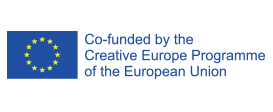This group, also known as the Consortium, has taken up the challenging endeavour of identifying their common features, articulating shared values, forging joint visions and reflecting on possible actions needed for the future of the highly diverse and complex performing arts sector, which is a major part of the European cultural sector. The Consortium has jointly curated the Forum’s programme, reflecting the most urgent issues at stake. Today, amidst the COVID-19 crisis, it has never been more evident that an open dialogue and enhanced collaboration across the entire creative value chain as well as the concerted cooperation with political stakeholders at all governing levels are the sector’s key assets for envisaging a sustainable future.
Thus, we believe that the pan-European sectoral collaboration – which is about learning from and about each other, creating a strong common voice and enhancing the policy dialogue – must be continued, deepened and taken to the next level.
The Unique Value of Theatre and the Performing Arts1
Theatre and the performing arts are powerful, majestic forms of artistic expression. They captivate minds, stimulate reflection and foster aesthetic growth. They possess a special power of revealing and generating the beauty – in all senses – of the world we live in. Theatre and the performing arts help individuals transcend the ordinary and nourish a sense of individual freedom. Along with their tremendous intrinsic value, theatre and the performing arts:
-
Foster democracy
Theatre and the performing arts have an inherent power to promote humanitarian values. They enable citizens of all ages to understand and accept different points of view, which is essential for a healthy democracy; -
Enhance social cohesion
Theatre and the performing arts foster the assembly of citizens, have the potential to provide the space and tools needed for various communities to engage in dialogue, and bring to light their concerns and feelings that are otherwise often excluded from social and political discourse. This fosters civic engagement and facilitates social cohesion – two conditions essential to enabling the EU not only to thrive, but to exist; -
Stimulate critical thinking
Theatre and the performing arts embrace qualities which too often get lost in our daily existence: they confront people with unexpected messages, unmediated and unframed, and invite spectators to take a critical look at the current reality, all in close physical proximity. Today, in digital times, when information is easily accessible and the patterns of comprehending reality are being simplified, theatre and the performing arts remain one of the few mediums that allow for and encourage critical thinking about the complex environment in which we live; -
Nourish empathy and imagination
Theatre and the performing arts trigger a very special human quality: the ability to identify with the “other”, to empathise with the character or body on stage. Theatre is a mirror of contemporary society, connecting our cultural heritage to the complexities of present-day reality while also bridging it with the ways in which we imagine the future. Both empathy and imagination are crucial for envisioning social and economic models that are more sustainable; -
Promote intercultural dialogue
Theatre and the performing arts promote intercultural dialogue. The cross-border mobility of artists and performances contributes to individuals’ awareness and appreciation of the diversity of languages and aesthetics, both within Europe and beyond. Collaboration in theatre and the performing arts helps forge the common identity and shared values of Europeans.
Each of the unique values of theatre and the performing arts will continue to be vital – no least in the process of reconstructing the damaged social fabric in the aftermath of the COVID crisis.
The Urgency of the Pan-European Focus on Theatre and the Performing Arts
The impact of COVID-19
During the pandemic, artists and all other professionals working in the sector have been going through an unprecedentedly long period of partial or complete inactivity, which has had a devastating effect on the entire value chain. Moreover, the effects of the second COVID-19 wave are putting the performing arts sector at an even higher risk of devastation.
The current crisis has demonstrated the interdependence of the highly diverse structures and players within the performing arts ecosystem. And, in some countries, it has exposed significant gaps between them: large and small organisations; artists and institutions; companies, venues and festivals; full-time staff and freelancers; independent, commercial and public structures. Gaps have also become evident in the different support mechanisms of each country. At the same time, the artists and arts organisations have shown an extraordinary level of inventiveness and determination to fight the impact of the crisis. They have also shown an enormous amount of solidarity, underlining the power of human capital, the core asset of theatre and the performing arts.
Key challenges
The pandemic has come hard on the heels of existing challenges that the various players within the sector have been facing for decades.
1. Working conditions and freedom of expression: Artists and performing arts professionals are increasingly dealing with the reality of uncertain or low incomes, complexities surrounding their employment status, scarce access to social security coverage or social benefits, as well as a lack of time to create and develop ideas and build consistent professional trajectories based on their artistic and social values. All those factors – paired with increasing attacks on artistic freedom all over Europe – are serious impediments to artists’ free and full-fledged professional development and their contribution to shaping democratic, progressive and cohesive societies. They also make it harder for the theatre to be a true public space for reflection, innovation and debate.
2. Environmental sustainability: Today, more than ever, artists and performing arts professionals are preoccupied with the question of how to emerge from the crisis in a more sustainable way. This is closely related to the environmental impact of the sector itself, generated by the artists’ mobility and touring, digital footprint, production and presentation modes, and other practices common in the theatre and performing arts ecosystem. The sector also wishes to figure out how it can play a more meaningful role in the sustainable transformation of our society at large.
3. Diversity, inclusion and access: The theatre and performing arts sectors have the very ambitious goal of representing the entire society in which they live and work, striving to be accessible to all citizens, regardless of their social or geographic background, age, race, gender, religion, physical ability or other factors. Diversifying audiences and making the sector itself more inclusive, diverse and accessible to all individuals starting from early childhood remain core challenges. This is aggravated by a lack of data, challenging socio-economic conditions in the sector, and an insufficient focus on diversity, inclusion and access in funding and policy agendas at various levels.
4. Internationalisation of collaborations and education: International collaboration is vital for the sector to thrive and cultivate open and interculturally minded audiences. While small organisations and independent artists are usually highly mobile and engaged in transnational projects, many other players in the sector still need more support to take part in pan-European and transcontinental collaborations. Language barriers and inconsistencies among the multiple national and regional programmes and funding schemes dedicated to internationalisation, compounded by an insufficient focus on the transnational dimension of arts education, are the main challenges preventing the sector from creating a strong pan-European and transcontinental dimension.
EU added value of an EU support strand
for theatre and the performing arts
The pan-European focus on the performing arts sector at the first European Theatre Forum, including the sector’s challenges, values and possible policy actions, has clearly shown a European added value. In light of the highly fragmented national and regional policy instruments supporting the sector (touring and co-production schemes, funding strategies, educational programmes, etc.), there is a need for coordinated action to enhance transnational collaboration and promote diversity in theatre and the performing arts. But for that to happen, it is imperative to develop a unified European vision for the sector’s recovery and sustainable future. Certain structural issues and challenges faced by the sector across Europe – in various forms and to various extents – would be best addressed at the EU level, complementing measures and programmes undertaken by the EU, and promoting and sharing best practices.
The Way Forward
We, the Consortium of twelve European performing arts networks and organisations, strongly believe that it is high time to establish clear strategies, concrete formats and special tools with which the sector can deepen the dialogue and, in collaboration with EU policymakers, develop the pan-European actions needed to support the European theatre and performing arts sector. Theatre and the performing arts have already profited greatly from European support through the Creative Europe Programme: as the biggest beneficiary of the Culture sub-programme, the sector has received more than €200 million. Yet, it is vital to build upon this success and establish a more targeted support strand for theatre and the performing arts. We are calling for a follow-up of the current sectoral and policy dialogue by organising the second European Theatre Forum in 2021 and setting up an EU support strand focused on theatre and the performing arts.
We envisage this process to be started and supported by the most essential and, in the current context relevant actions:
1. Urgently, to develop a comprehensive and coordinated plan to support and revive the sector during and after the pandemic. Increased and continued financial support must be at the heart of such a plan. The full list of recommendations can be found in the statement by Pearle* – entitled “Give live performance a future” – and in the joint position statement by the European social partners. We believe that various European Commission DGs, committees of the European Parliament and national ministries should work together on such a plan in a concerted manner, aiming at delivering fair, inclusive and sustainable support and recovery tools.
2. To implement the European Framework for Working Conditions in CCS and CCI, which was proposed by the European Parliament’s Resolution on Cultural Recovery of Europe and developed in close dialogue with sectoral players of all levels and types.
3. To address the urgent need to defend the freedom of artistic expression and acknowledge the undeniable power of the arts to open minds and encourage critical reflection.
Moreover, we believe that the EU sectoral support strand should be structured around the exploration of the following actions:
4. Enhancing the focus on inclusion, diversity and access in the performing arts sector, policy agendas and funding programmes, including Creative Europe 2021-2027. We call for the collection of data in this domain at the EU level and the creation of a special sectoral working group aimed at designing an EU instrument for inclusion, access and diversity in the sector which includes a focus on rural areas, the involvement of artists with minority backgrounds, and education in and through the performing arts.
5. Fostering the internationalisation of the theatre and performing arts sector at two levels:
- Increasing structural support for international collaboration through augmented and continued funding for co-production, networking, cross-border touring, the development of surtitling tools and other tools that expand access (sign-language, captioned performances); exploring and designing an EU programme to foster the internationalisation of theatre and performing arts studies, both within Europe and globally.
- Promoting Europe’s diverse theatre programme and activities to improve the audience’s experience and foster openness and accessibility through communication campaigns such as a European Theatre Label.
6. Addressing environmental sustainability at two levels:
- The role of the sector in implementing the European Green Deal, as a driver of social innovation and contributor to the cultural shift needed for the sustainable transformation of contemporary societies and economies;
- The sustainable transition of the sector itself through funding, financial incentives, training and awareness-raising; the promotion of existing best practices; research and innovation; the implementation of new models and specifications of mobility justice and more.
7. Promoting the European theatre and performing arts as a public space where an open societal dialogue can take place and diverse voices can be heard; as a public yet very specific and contained local gathering place in a European context of multilingualism and social diversity; as a public space that allows artists and performing arts professionals to be avant-garde and frame our culture, our societies and visions of a better and more open future for Europe. The current moment challenges us to reimagine and rethink how we live together as a society, and how we can reconnect spaces and people in the post-COVID world.
8. Working towards creating a consistent and regular system of collecting data in the sector based on indicators agreed by the member states and made available at a European level, for example by Eurostat or the Council of Europe. Indicators would include: demographics, economic indicators, social impact, environmental footprint, mobility (import and export), working conditions and more.
We believe that the exploration and implementation of the above recommendations should start in 2021 by setting up topic-based focus groups and offering the space and tools the sector and policymakers need in order to co-create viable, feasible and truly relevant solutions that could subsequently be embraced by the EU support strand for theatre and performing arts. We call on the tripartite Presidency of the Council of the EU (Germany, Portugal and Slovenia), in cooperation with the European Commission, to follow up on the current process, continue the dialogue and organise the second European Theatre Forum in 2021.
After a seven-month period of intense and multifaceted dialogue, the members of the Consortium have generated and amassed vast knowledge and materials that are ready to be used in the next stage: to organise working groups, to design concrete policy initiatives and to enhance policy dialogue. We are highly motivated to embark on this important journey with the European Commission, the European Parliament, EU Presidencies and member states.
13 November 2020
1 The values of theatre and the performing arts are elaborated further in the manifesto “Power of the Performing arts in Europe”, elaborated by IETM and co-signed by Circostrada, EDN, ETC and In-situ (2019)
Authors
Editorial Team
The Dresden Declaration was drafted and edited based on the contributions of the Consortium Members by the appointed editorial team: Elena Polivtseva (IETM), Anita Debaere & Silke Lavani (PEARLE*), Kathrin Deventer (EFA) and Heidi Wiley (ETC).
The Consortium
The Consortium consists of theatre networks and performing arts organisations that were present at the European Theatre Expert Group organised by the European Commission in November 2019 as well as at the first theatre network gathering in Bratislava in November 2018. The members of the Consortium and authors of this paper are:
Assitej International, represented by Stefan Fischer-Fels, Member of the Executive Committee of Assitej International / Head of the Youth Department of Düsseldorfer Schauspielhaus, and Louis Valente Sørensen, Secretary General of ASSITEJ International.
Bundesverband Freie Darstellende Künste (BFDK), represented by Stephan Behrmann, General Manager of BFDK, and Janina Benduski, Chair of the Board of BFDK.
Europe: Union of Theatre Schools and Academies (E:UTSA), represented by Regina Guhl, General Secretary of E:UTSA / Vice-Dean of the Acting Department at the University of Music, Media and Drama Hannover, and Elisabeth Schweeger, Treasurer of E:UTSA / Artistic Director and CEO of the Academy of Performing Arts Baden-Wuerttemberg in Ludwigsburg.
European Association of Independent Performing Arts (EAIPA), represented by Ulrike Kuner, President of EAIPA / Managing Director of IG Freie Theaterarbeit.
European Festival Association (EFA), represented by Kathrin Deventer, Secretary General of EFA, Fabrizio Grifasi, Director of the RomaEuropa Festival, and Haris Pašović, Director of Mittelfest and Sarajevo Fest Art and Politics.
European Theatre Convention (ETC), represented by Serge Rangoni, President of ETC / General & Artistic Manager of Théâtre de Liège, and Heidi Wiley, Executive Director of ETC.
IETM, represented by Jeffrey Meulman, Vice President of IETM, Elena Polivtseva, Head of Policy and Research at IETM, and Ása Richardsdóttir, General Secretary of IETM.
International Theatre Institute (ITI) – German Centre, represented by Thomas Engel, Director of ITI Germany, and Jan Linders, board member of ITI Germany / Head of Programme of the Humboldt Forum.
mitos21, represented by Iphigenia Taxopoulou, General Secretary of mitos21.
Pearle*, Live Performance Europe, represented by Anita Debaere, Director of Pearle*, and Silke Lalvani, Head of Public Affairs of Pearle*.
PROSPERO, represented by Tobias Veit, Executive Director of Schaubühne Berlin.
Union des Théâtres de l’Europe (UTE), represented by Florian Hirsch, Head Dramaturge at the National Theatre of Luxembourg, and Gábor Tompa, President of UTE / Director of the Hungarian Theatre of Cluj.



















